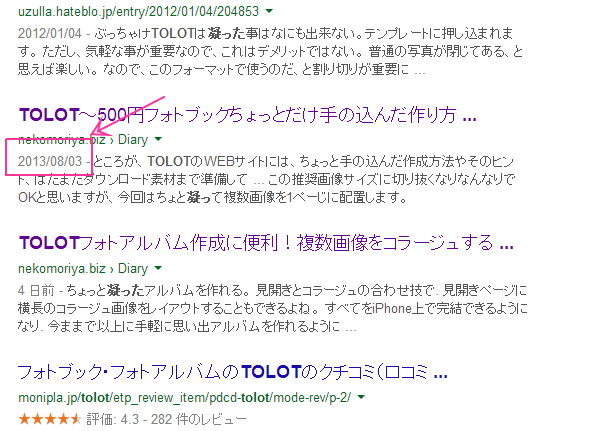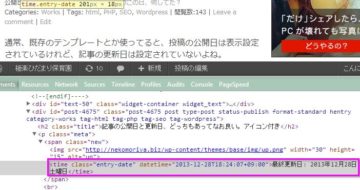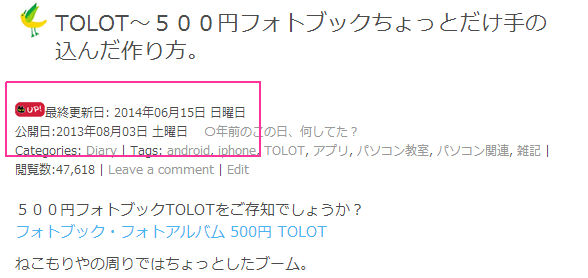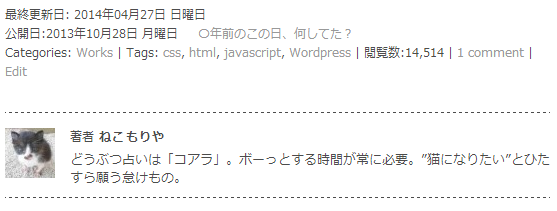スポンサー
Warning: Undefined variable $post in /home/nekomoriya/nekomoriya.biz/public_html/wp-content/plugins/code-snippets/php/snippet-ops.php(663) : eval()'d code on line 21
Googleの期間指定での検索結果に
公開日より最終更新日の方が新しければ、最終更新日を反映させたいと思いやってみて数か月。
そろそろ、反映されてるかと思ったけども・・・

なにがいけないんだろうと改めて検索してみると、出てこなかったのか目に入らなかったのか、当時は意識外の情報が。
改めて、構造化データ テスト ツールで確認してみると
エラー: Missing required field “entry-title”.
エラー: Missing required field “updated”.
エラー: Missing required hCard “author”.
のエラーが・・・
日付に関しては「エラー: Missing required field “updated”.」が関係ありそう。
著者情報に関しては「エラー: Missing required hCard “author”.」。
このエラーを無くせば良いのでは?ということで、前回の対処に付け加えたことを記し、また数週間後に確認してみたいと思います。
前回の対処はこちら↓
Googleの検索結果の日付を最終更新日にする為にやってみたこと。

少し前になるのだけども、各投稿のmeta情報部分の”公開日”にnewマークを付けた。 [otherpost id=3705]その後、ふとしたことからGoogleの検索結果に最終更新日を表示できるようにすると例えばGoogle検索のオプ
エラー回避
まずは、エラーを無くすために付け加えたこと。
エラー: Missing required field “entry-title”.への対処
single.php(個別記事テンプレート)で、タイトル部分を探して”class entry-title”を付け加える。
<h2 class="title"><?php the_title(); ?></h2>
を
<h2 class="title entry-title"><?php the_title(); ?></h2>
に。
エラー: Missing required field “updated”.への対処


single.php(個別記事テンプレート)で日付表示部分を探して ”class date updated”を付け加える。
ねこもりやの場合、この部分長いのでmeta.phpという別ファイルにしてテンプレートに読み込んでいます。
詳しくは、前回の投稿をご参考に→Googleの検索結果の日付を最終更新日にする為にやってみたこと。
<?php if (get_the_modified_date('Y/n/j') != get_the_time('Y/n/j')) : ?>
<span class="new">
<?php
$days=3; //UPをつける日数
$today=date_i18n('U');
$entry=get_the_modified_date('U');
$sa=date('U',($today - $entry))/86400;
if( $days > $sa ){
echo '<img src="';
bloginfo('template_directory');
echo '/img/up.png" width="30" height="15" alt="up" />';
}
?>
<time class="entry-date" datetime="<?php the_modified_time('c') ?>"><?php if ($mtime = get_mtime('Y年m月d日 l')) echo '最終更新日: ', $mtime; ?></time>
</span>
<?php endif; ?>
<br />
<span class="new">
<?php
$days = 3; //Newを表示させたい期間の日数
$today = date_i18n('U');
$entry = get_the_time('U');
$kiji = date('U',($today - $entry)) / 86400 ;
if( $days > $kiji ){
echo '<img src="';
bloginfo('template_directory');
echo '/img/new.png" width="30" height="15" alt="new" />';
}
?>
<?php if (get_the_modified_date('Y/n/j') == get_the_time('Y/n/j')) : ?>
公開日:<time class="entry-date" datetime="<?php the_time('c') ;?>"><?php the_time('Y年m月d日 l') ?></time>
<?php elseif (get_the_modified_date('Y/n/j') != get_the_time('Y/n/j')) : ?>
公開日:<?php the_time('Y年m月d日 l') ?>
<?php endif; ?>
</span>
を
<p class="meta">
<?php if (get_the_modified_date('Y/n/j') != get_the_time('Y/n/j')) : ?>
<span class="new">
<?php
$days=3; //UPをつける日数
$today=date_i18n('U');
$entry=get_the_modified_date('U');
$sa=date('U',($today - $entry))/86400;
if( $days > $sa ){
echo '<img src="';
bloginfo('template_directory');
echo '/img/up.png" width="30" height="15" alt="up" />';
}
?>
<time class="entry-date date updated" datetime="<?php the_modified_time('c') ?>"><?php if ($mtime = get_mtime('Y年m月d日 l')) echo '最終更新日: ', $mtime; ?></time>
</span>
<?php endif; ?>
<br />
<span class="new">
<?php
$days = 3; //Newを表示させたい期間の日数
$today = date_i18n('U');
$entry = get_the_time('U');
$kiji = date('U',($today - $entry)) / 86400 ;
if( $days > $kiji ){
echo '<img src="';
bloginfo('template_directory');
echo '/img/new.png" width="30" height="15" alt="new" />';
}
?>
<?php if (get_the_modified_date('Y/n/j') == get_the_time('Y/n/j')) : ?>
公開日:<time class="entry-date date published updated" datetime="<?php the_time('c') ;?>"><?php the_time('Y年m月d日 l') ?></time>
<?php elseif (get_the_modified_date('Y/n/j') != get_the_time('Y/n/j')) : ?>
公開日:<span class="date published"><?php the_time('Y年m月d日 l') ?></span>
<?php endif; ?>
</span>
<span><a href="<?php bloginfo('home'); ?>/?monthnum=<?php the_time('m') ?>&day=<?php the_time('d') ?>" class="olddays">〇年前のこの日、何してた?</a></span>
<br />
<?php if ( count( get_the_category() ) ) : ?>
<?php printf( __( 'Categories: %2$s', 'ari' ), 'entry-utility-prep entry-utility-prep-cat-links', get_the_category_list( ', ' ) ); ?>
|
<?php endif; ?>
<?php
$tags_list = get_the_tag_list( '', ', ' );
if ( $tags_list ):
?>
<?php printf( __( 'Tags: %2$s', 'ari' ), 'entry-utility-prep entry-utility-prep-tag-links', $tags_list ); ?>
|
<?php endif; ?>
閲覧数:<?php if ( function_exists ( 'wpp_get_views' ) ) { echo wpp_get_views ( get_the_ID() ); } ?>
|
<?php comments_popup_link( __( 'Leave a comment', 'ari' ), __( '1 comment', 'ari' ), __( '% comments', 'ari' ) ); ?>
<?php edit_post_link( __( 'Edit', 'ari' ), '| ', '' ); ?></p>
に。
投稿や更新から三日間はNew!アイコンなんかをつけるようにしてるのに加えて、条件分岐で色々やってるので長いです。
解説すると、更新日が公開日より新しい場合は、更新日に日付データとして認識するように、
<time class="entry-date
”timeタグ”をつけています。
もし、更新日が公開日より古い場合は、公開日に同様に
<time class="entry-date
としています。
なので、
更新日を日付データにする場合、
<time class="entry-date date updated" datetime="<?php the_modified_time('c') ?>"><?php if ($mtime = get_mtime('Y年m月d日 l')) echo '最終更新日: ', $mtime; ?></time>
公開日の日付はtimeタグではなく、spanタグで
公開日:<span class="date published"><?php the_time('Y年m月d日 l') ?></span>
としました。
公開日が日付データになる場合の部分は、
公開日:<time class="entry-date date published updated" datetime="<?php the_time('c') ;?>"><?php the_time('Y年m月d日 l') ?></time>
です。
これで、良いのかどうかはわかりませんが、とりあえずエラーはなくなったので良しとして。
エラー: Missing required hCard “author”.
最後に「エラー: Missing required hCard “author”. 」への対処。
これをちゃんと設定できれば、検索結果に著者情報として載るのかな?
footer.php(フッターテンプレート)に以下を追加。
by<span class="vcard author"><span class="fn n"><a href="https://plus.google.com/u/0/Google+の自分のプロフィールページ/posts" rel="author"><span class="family-name">苗字</span><span class="given-name">名前</span></a></span>
加えて、single.phpに著者情報を表示しているなら、
著者<span class="vcard author"><span class="fn nickname"><?php get_the_author() ; ?></span></span>
とする。
ねこもりやの場合、ニックネームを表示しているので ”fn nickname”にしてますが本名の場合”fn”だけで良いかなと。
参考サイト
後記
まだ、施したばかりでどうなるかはわからないのだけど
数週間後には結果が出るでしょう。
またこちらでご報告できればと思います。
スポンサー



